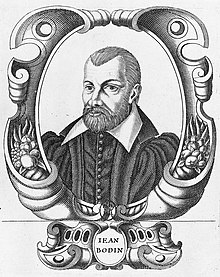Jean Bodin
| Jean Bodin | |
|---|---|
 |
|
| Born | 1530 Angers |
| Died | 1596 Laon |
| Era | Renaissance philosophy |
| Region | Western philosophy |
|
Main interests
|
Legal philosophy, political philosophy, economy |
|
Notable ideas
|
Quantity theory of money, absolute sovereignty |
|
Influences
|
|
|
Influenced
|
|
Jean Bodin (1530–1596) was a French jurist and political philosopher, member of the Parlement of Paris and professor of law in Toulouse. He is best known for his theory of sovereignty; he was also an influential writer on demonology.
Bodin lived during the aftermath of the Protestant Reformation and wrote against the background of religious conflict in France. He remained a nominal Catholic throughout his life but was critical of papal authority over governments, favouring the strong central control of a national monarchy as an antidote to factional strife. Toward the end of his life he wrote, but did not publish, a dialogue among different religions, including representatives of Judaism, Islam and natural theology, in which all agreed to coexist in concord.
Bodin was successively a friar, academic, professional lawyer, and political adviser. An excursion as a politician having proved a failure, he lived out his life as a provincial magistrate.
Bodin was born near Angers, possibly the son of a master tailor, into a modestly prosperous middle-class background. He received a decent education, apparently in the Carmelite monastery of Angers, where he became a novice friar. Some claims made about his early life remain obscure. There is some evidence of a visit to Geneva in 1547/48 in which he became involved in a heresy trial. The records of this episode, however, are murky and may refer to another person.
He obtained release from his vows in 1549 and went to Paris. He studied at the university, but also at the humanist-oriented Collège des Quatre Langues (now the Collège de France); he was for two years a student under Guillaume Prévost, a little-known magister in philosophy. His education was not only influenced by an orthodox Scholastic approach but was also apparently in contact with Ramist philosophy.
...
Wikipedia
